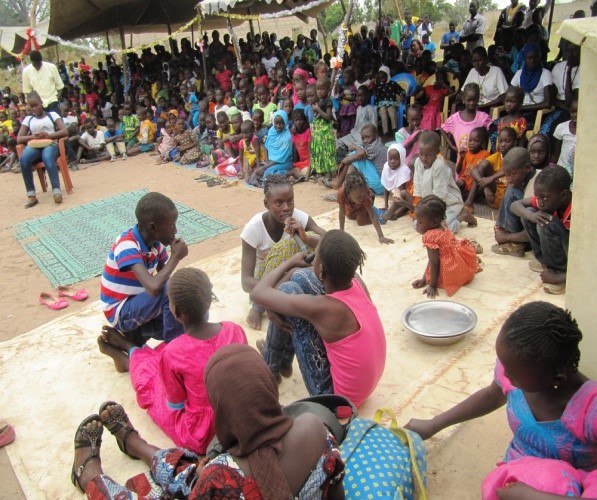Kids' clubs improving children's class performance in Fatick
Children in the Fatick area in Senegal, comprising Serere, Diola, Peulh and other smaller communities struggle as there are not many opportunities for them to learn and develop valuable life skills that can help shape their futures and development. There is little variety when it comes to playing and recreation. Apart from soccer, there is little else that creatively engages the energies of children after school hours. Both adults and children say that the informal space outside school is limited and difficult to develop programs or ideas for creative life skills. Delphine Beassin, school girl in Salemata, Kedougou states: “Often, after school, we do not have places to go and play” and Diene Ngom, a father of two Registered Children in Diakhao ADP in the Fatick Base of WV Senegal confirms it: “The reality of our village context is that children have nowhere to go for entertainment and other activities that can shape their life skills”.
The introduction of the kids’ clubs, which is a US funded concept, in its coverage areas has therefore been a welcome relief for children, parents and communities. Kids’ Club (KC) monitors, selected from communities are trained in KC management and taught creative ways to engage and sustain children’s attention. A wide variety of club activities that engage the thinking and interest of children are provided. These include singing and dancing, choreography, play acting, storytelling, many of which involve physical recreational activity and engage the thinking capacity of club participants. The subject matter of club activities are many and varied and cover areas such as God and creation, neighbourliness, hygiene, the environment etc. In club lessons, morals are drawn for children of all backgrounds. KC activities have therefore been a handy way to capture the after school hours of children in project areas in very interesting ways. Delphine Beassin goes on to say “…club activities became attractive for most children. In the clubs, we play with others, we learn lessons about hygiene, how to keep the environment clean and respect each other”.
Apart from achieving the intended impact of creating safe places in communities for children to play, Kids’ Clubs operations are also beginning to impact children’s school work in project areas in positive ways. Diene Ngom, the father of 2 Registered Children in Diakhao ADP testifies to the improvement of his children’s performance. “We noticed that the kids’ club activities have a great impact in the lives of our children…. . They find the clubs as places for fun and entertaining. We have however found that in addition to the entertainment, children learn a lot of things that contribute to their education. For example, children who were shy and non-expressive in public places and gatherings are no longer shy and participate in class lessons in school. Teachers report improvements in class participation of children of the kids clubs. We are therefore encouraged by the activities and are encouraging instructors to continue with the program”. Shyness in children indeed is an inhibition to class work and replacing shyness with expression enables children to gain self-confidence which bodes well for improved school performance. This unintended benefit of Kids’ Club activities in enabling children to be less shy is a very welcome one for both children and parents. Children are not only having great moments to play in their communities, they are also learning useful lessons and concepts which will help their life-skills development. Beyond these children are being helped in creative ways to learn at school. Parents are all the happier for this new development in their communities as they see their children learn in their playtime. Parents are getting more and more involved with their children in areas which until now had been considered ‘children’s affair’.
Author: Jean de Dieu Ngouala, Coordinator Faith and Development project.
Photos : Delphine Rouiller & Jean de Dieu Ngoula
